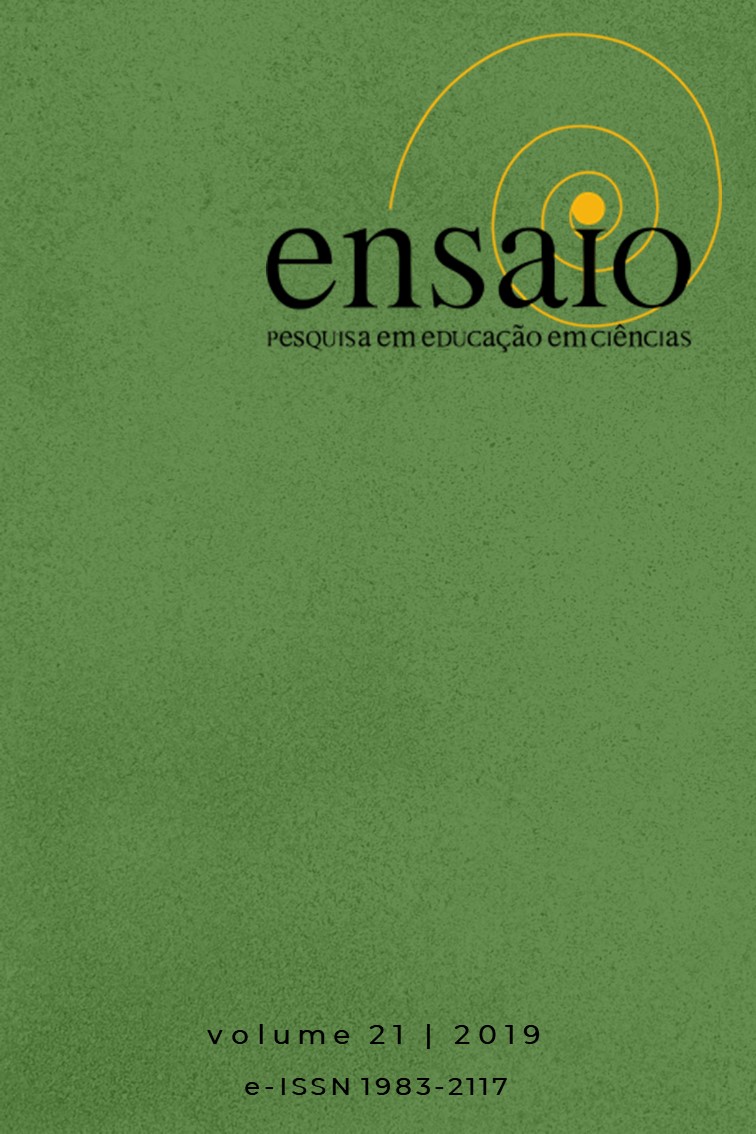A CONSTITUIÇÃO DE NORMAS E PRÁTICAS CULTURAIS NAS AULAS DE CIÊNCIAS: PROPOSIÇÃO E APLICAÇÃO DE UMA FERRAMENTA DE ANÁLISE
THE CONSTITUTION OF CULTURAL NORMS AND PRACTICES IN SCIENCE CLASSES: PROPOSITION AND APPLICATION OF AN ANALYSIS TOOL
DOI:
https://doi.org/10.1590/1983-21172019210104%20Palabras clave:
Ensino de Ciências; Normas Culturais; Práticas Culturais.Resumen
Atualmente, defende-se que os objetivos do ensino de ciências abranjam a participação dos estudantes nas dimensões conceitual, social, epistêmica e material do trabalho científico. Nesse contexto, emergem estudos sobre como normas e práticas das comunidades científicas podem ser promovidas na escola, criando a necessidade de ferramentas que possibilitem esse processo de análise. Neste trabalho, apresentamos uma ferramenta sustentada em referências que compreendem a construção do conhecimento como uma prática social e que auxilia na identificação de operações de professores e estudantes que evidenciam como normas e práticas científicas são partilhadas em aula. Em um exemplo de aplicação da ferramenta, buscamos apontar suas possibilidades de uso e seu potencial para relacionar normas e práticas.
Currently, it is argued that the objectives of Science education should promote students’ participation in the conceptual, social, epistemic and material dimensions of scientific work. In this context, studies emerge about how norms and practices of scientific communities can be promoted in the school, creating the need for tools that enable this process of analysis. In this paper, we present a tool based on references that comprise the construction of knowledge as a social practice and that assists in the identification of operations of teachers and students that show how scientific norms and practices are shared in class. In an example of application of the tool, we seek to point out its possibilities of use and its potential to relate norms and practices.
Descargas
Citas
BERLAND, L.K.; SCHWARZ, C.V.; KRIST, C.; KENYON,. L.; LO, A.S.; REISER, B.J. Epistemologies in Practice: Making Scientific Practices Meaningful for Students. Journal of Research in Science Teaching, v. 53, n. 7, p. 1082-1112, 2016. [ Links ]
BLOOME, D., et al. Microethnographic Approach to the discourse analysis of cultural practices in classroom language and literacy events . In: BLOOME, D., et al. Discourse analysis and the study of classroom language and literacy events: a microethnographic perspective. Malwah: Lawrence Erlbaum Associates, 2005. [ Links ]
FORD, M. J., Educational Implications of Choosing “Practice” to Describe Science in the Next Generation Science Standards. Science Education, v. 99, n. 5, p. 1041-1048, nov, 2015. [ Links ]
GONZALEZ-HOWARD, M.; MCNEILL, K.L. Learning in a community of practice: factors impacting english-learning students’engagement in scientific argumentation. Journal of Research in Science Teaching, v. 53, n.. 4, p. 527-553, 2016. [ Links ]
KELLY, G. Inquiry teaching and learning: philosophical considerations. In: MATTHEWS, M.R. (ed.). International Handbook of Research in History, Philosophy and Science teaching. Nova York: Springer, 2014. [ Links ]
KRASILCHIK, M. Reformas e realidade: o caso do ensino das ciências. São Paulo em Perspectiva, São Paulo, v.14, n.1, p. 85-93, 2000. [ Links ]
LONGINO, H. E. The fate of knowledge. Princeton: Princeton University Press, 2002. [ Links ]
MUNFORD, D.; LIMA, M.E.C. de C. Ensinar ciências por investigação: em que estamos de acordo? Ensaio Pesquisa em Educação em Ciências, Belo Horizonte v. 9, n. 1, p. 89-11, jun. 2007. [ Links ]
NATIONAL RESEARCH COUNCIL (NRC). A framework for K-12 science education: Practices, crosscutting concepts, and core ideas. Committee on a Conceptual Framework of New K-12 Science Education Standards. Board on Science Education. Division of Behavioral and Social Sciences and Education. Washington, DC: The National Academies Press, 2011. [ Links ]
NAYLOR, S., KOGH, B., DOWNING, B. Argumentation and Primary Science. Research in Science Education, v. 37, n. 1, p 17-39, mar, 2007. [ Links ]
OSBORNE, J. Teaching scientific practices: Meeting the challenge of change. Journal of Science Teacher Education. v. 25, n. 2, p. 177-196, mar, 2014. [Links]
SANDOVAL, A.W. Understanding Students’ Practical Epistemologies and Their Influence on Learning Through Inquiry. Science Education, v. 89, n. 4, p. 634-656, 2005. [ Links ]
SCARPA, D. L.; TRIVELATO, S. L. F. Movimientos entre cultura escolar y cultura científica: análisis de argumentos en diferentes contextos. Magis(Editorial Pontificia Universidad Javeriana), v. 6, p. 87-103, 2013. [ Links ]
STROUPE, D. Examining Classroom Science Practice Communities: How Teachers as Students Negotiate Epistemic Agency and Learn Science-as-practice. Science Education, v. 98, n. 3, abr, 2014. [ Links ]
STROUPE, D. Describing “Science Practice” in Learning Settings. Science Education, v. 99, n. 6, nov, 2015. [ Links ]
WINDSCHITL, M., THOMPSON, J., BRAATEN, M. Beyond the scientific method: Model-Based Inquiry as a new paradigm of preference for school science investigations. Science Education, v. 92, n. 5, p. 941-967, set. 2008. [Links]


